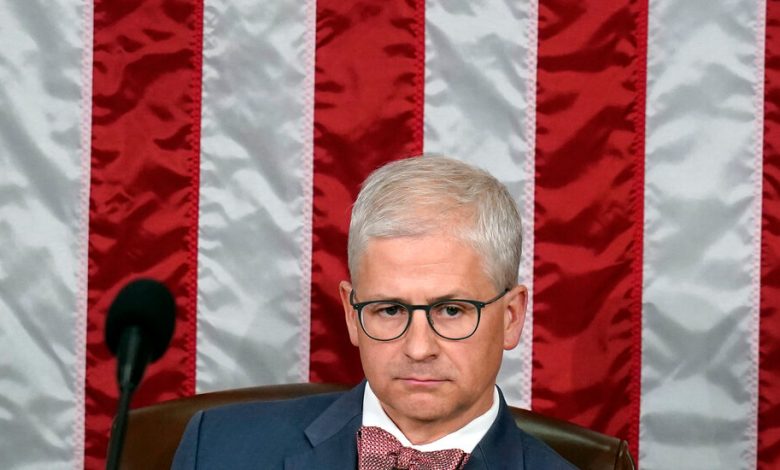How an Interim Speaker Patrick McHenry Could Actually Govern

In the first nearly 10 months of their majority, Republicans have nominated three different people to serve as speaker of the House, and not one of them currently holds the gavel. Jim Jordan’s defeat at the hands of mainly centrists, following the demise of Steve Scalise and Kevin McCarthy at the hands of conservatives, cements the idea that there may be no person who can unify the Republican conference.
In the absence of a speaker, the House of Representatives has gone dormant. No bills have come up for a vote. New pieces of legislation are not being sent to committee for consideration. And while the world is looking to the United States for decisive action, the prospects for electing a new speaker right now are bleak.
House Republicans are left with a choice: continue their interminable ritual of self-sabotage and try to advance yet another nominee to be speaker, or shelve this debate and get to work without one. The second option is not a durable solution, but it is a path forward. The House has the ability to legislate, and it must take it.
In the absence of an elected speaker, Patrick McHenry of North Carolina has been acting as speaker pro tempore, thanks to a 2003 House rule that requires each new speaker to draft a list of temporary successors in the event they are incapacitated. Mr. McHenry was unfortunate enough to top Mr. McCarthy’s list.
House Republicans may not deserve a leader like Mr. McHenry, but they’re fortunate to have him. He is a serious person, widely respected for his honesty and intellect. Previously a member of the House leadership, he left that path to pursue a more policy-focused role leading the important Financial Services Committee. He has also resisted the worst impulses of the current House Republican conference, for example, voting to certify the results of the 2020 election.
The rule elevating Mr. McHenry was a product of a post-9/11 House working group on the continuity of government, intended to ensure that the House could function in an emergency. There is some debate about what powers the speaker pro tempore has under the rule, but it says plainly that the person’s primary responsibility is to oversee the House’s election of a new speaker.
It seems preposterous in the context of Sept. 11 that such a rule would not allow the speaker pro tempore to take emergency legislative action. I’ve spoken with people involved in drafting the rule, however, and they insist it was the intent for the pro tempore to do no more than oversee a speaker election. They never even contemplated the idea that the House couldn’t quickly elect one.
So, what now if it can’t? There are two ways to restart the business of the House without a speaker. The cleanest solution is a vote of the body to give Mr. McHenry the full legislative powers of the speaker, perhaps for only a fixed period. That has been done for planned absences of speakers. But it would, of course, require support from a majority of the House, and we can expect some Republicans to balk at this end around.
There is growing talk of a bipartisan governing arrangement, with Democrats voting to empower Mr. McHenry in exchange for rules favorable to the minority party. We should not place much stock in that. While the House has figuratively lit itself on fire, many Republican members would literally rather do so than allow Democrats to share control over the chamber. If Democrats are seeking something in exchange for their votes, they will instead have to have faith that Mr. McHenry will act fairly and urgently to bring up legislation in support of Israel and Ukraine, as well as to fund our own government.
Alternatively, if Republicans and Democrats can’t bring themselves to formally vote to empower Mr. McHenry, he may simply need to act on his own. In the absence of clear rules, the House operates on precedent. We are in an unprecedented situation. And the House’s rules, functionally, are whatever a simple majority say they are.
So far, Mr. McHenry has operated under a narrow interpretation of his powers. But there is nothing stopping him from trying to use his authority to recognize members for motions to bring up legislation. For example, he could move to recognize a member who wishes to have a vote on a resolution condemning the Hamas terror attacks.
This would be a first step toward resuming House business, even if it would not be without contention or controversy. Another member would likely challenge whether a vote on that hypothetical resolution was even allowed under House rules. If the parliamentarian were to advise that it was out of order, the House could vote to appeal and overrule that judgment. Mr. McHenry would be daring members of the House to block consideration of policy that most seem to badly want to support, and if they were successful, it could break the seal on the ability to legislate under a temporary speaker.
From there, as more complicated measures come up, some governing coalition would need to continue to provide the votes needed to allow the House to operate issue by issue. In effect, the House would live or die on whatever a majority of its members would tolerate. Some might say that’s how it should be.
All of this is unstable and unsustainable, but so too is our current course. While Mr. McHenry’s lack of legitimacy would no doubt be used against him by his own party as well the Senate, allowing the House to rely more on its members for direction could be a healthy exercise.
A strong speaker is good for the operation of the House, but it also true that members of Congress have become too comfortable with using the speaker to shirk their own responsibilities as lawmakers. Rather than devoting themselves to policymaking and the legislative process, too many members increasingly sit back and demand that the speaker turn their policy preferences — however far-fetched — into reality.
Mr. Jordan is a perfect example of that kind of grandstander. No bill he has introduced in his almost 17 years in Congress has ever become law, though he has had no shortage of opinions and complaints about how speakers have legislated.
Reopening the House without a speaker does not guarantee legislative progress and normal order, but it could give members fresh buy-in to the work of the body. And if it fails, perhaps it will help some members to learn that an overbearing speaker is not to blame for their woes, but rather the refusal of too many to accept what is required to govern.
Brendan Buck is a communications consultant who previously worked for the Republican speakers of the House Paul D. Ryan and John Boehner.
The Times is committed to publishing a diversity of letters to the editor. We’d like to hear what you think about this or any of our articles. Here are some tips. And here’s our email: [email protected].
Follow The New York Times Opinion section on Facebook, Twitter (@NYTopinion) and Instagram.





